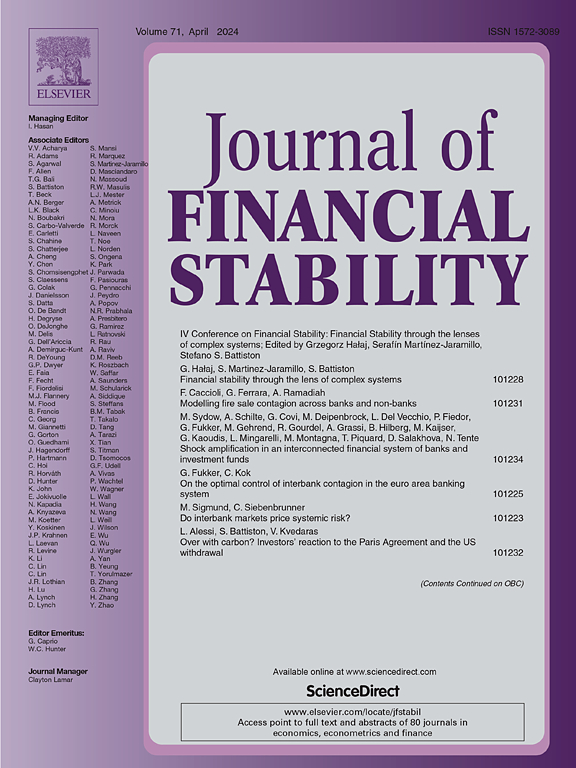Institutional ownership and bank failure
IF 4.2
2区 经济学
Q1 BUSINESS, FINANCE
引用次数: 0
Abstract
We study the relationship between bank failure and dedicated institutional ownership (hereafter IO) employing a logit model. We focus on dedicated institutional investors (hereafter IIs) as defined by Bushee (2001) and Bushee and NOE (2000) because they are stable shareholders and have large investments in the investee companies. Four results are obtained. First, based on the instrumental variable approach, a greater proportion of dedicated IO is associated with reduced probability of bank failure. This result is robust to the propensity score matching technique. The rationale is that dedicated IIs collect information on the investee banks by holding stable and concentrated positions in these banks, monitor them, and reduce their ownership in cases of trouble earlier than other IIs do. This effect has a larger magnitude in banks with greater organizational complexity and larger size. Second, after controlling for the sell herding effect of other IIs, we find that the dedicated IO proportion still has a negative and significant coefficient, indicating that dedicated IIs trade on fundamental information rather than herding with other IIs. Third, three potential channels of collecting information, (i) placing representatives on the board as directors, (ii) greater capacity in analyzing financial statements through cross-ownership in other banks, and (iii) higher monitoring incentive due to more stable and concentrated ownership, are investigated. We find evidence in favor of the effect of cross-ownership in the banking industry, ownership stability and concentration. Fourth, the ownership of dedicated IIs is significantly larger in banks acquired by other banks than those filing for Chapter 7 liquidation, ascribing a constructive role for dedicated IIs.
机构所有权和银行破产
我们采用logit模型研究了银行倒闭与专用机构所有权(以下简称IO)之间的关系。我们专注于Bushee(2001)和Bushee and NOE(2000)所定义的专门机构投资者(以下简称ii),因为他们是稳定的股东,并且在被投资公司中拥有大量投资。得到了四个结果。首先,基于工具变量方法,更大比例的专用IO与银行倒闭的可能性降低有关。该结果对倾向得分匹配技术具有鲁棒性。其基本原理是,专门的IIs通过在这些银行持有稳定和集中的头寸来收集有关这些银行的信息,对它们进行监控,并在出现问题时比其他IIs更早地减少其所有权。在组织复杂性和规模较大的银行中,这种影响的幅度更大。其次,在控制了其他i的卖出羊群效应后,我们发现专用i的比例系数仍然为负且显著,这表明专用i是根据基本信息进行交易,而不是与其他i进行羊群交易。第三,研究了三种潜在的信息收集渠道,即(i)在董事会中设置代表,(ii)通过其他银行的交叉持股提高财务报表分析能力,(iii)由于更稳定和集中的股权而具有更高的监督激励。我们找到了支持银行业交叉持股、股权稳定性和集中度效应的证据。第四,与申请第七章清算的银行相比,被其他银行收购的银行中,专门ii的所有权明显更大,这归因于专门ii的建设性作用。
本文章由计算机程序翻译,如有差异,请以英文原文为准。
求助全文
约1分钟内获得全文
求助全文
来源期刊

Journal of Financial Stability
Multiple-
CiteScore
7.70
自引率
9.30%
发文量
78
审稿时长
34 days
期刊介绍:
The Journal of Financial Stability provides an international forum for rigorous theoretical and empirical macro and micro economic and financial analysis of the causes, management, resolution and preventions of financial crises, including banking, securities market, payments and currency crises. The primary focus is on applied research that would be useful in affecting public policy with respect to financial stability. Thus, the Journal seeks to promote interaction among researchers, policy-makers and practitioners to identify potential risks to financial stability and develop means for preventing, mitigating or managing these risks both within and across countries.
 求助内容:
求助内容: 应助结果提醒方式:
应助结果提醒方式:


